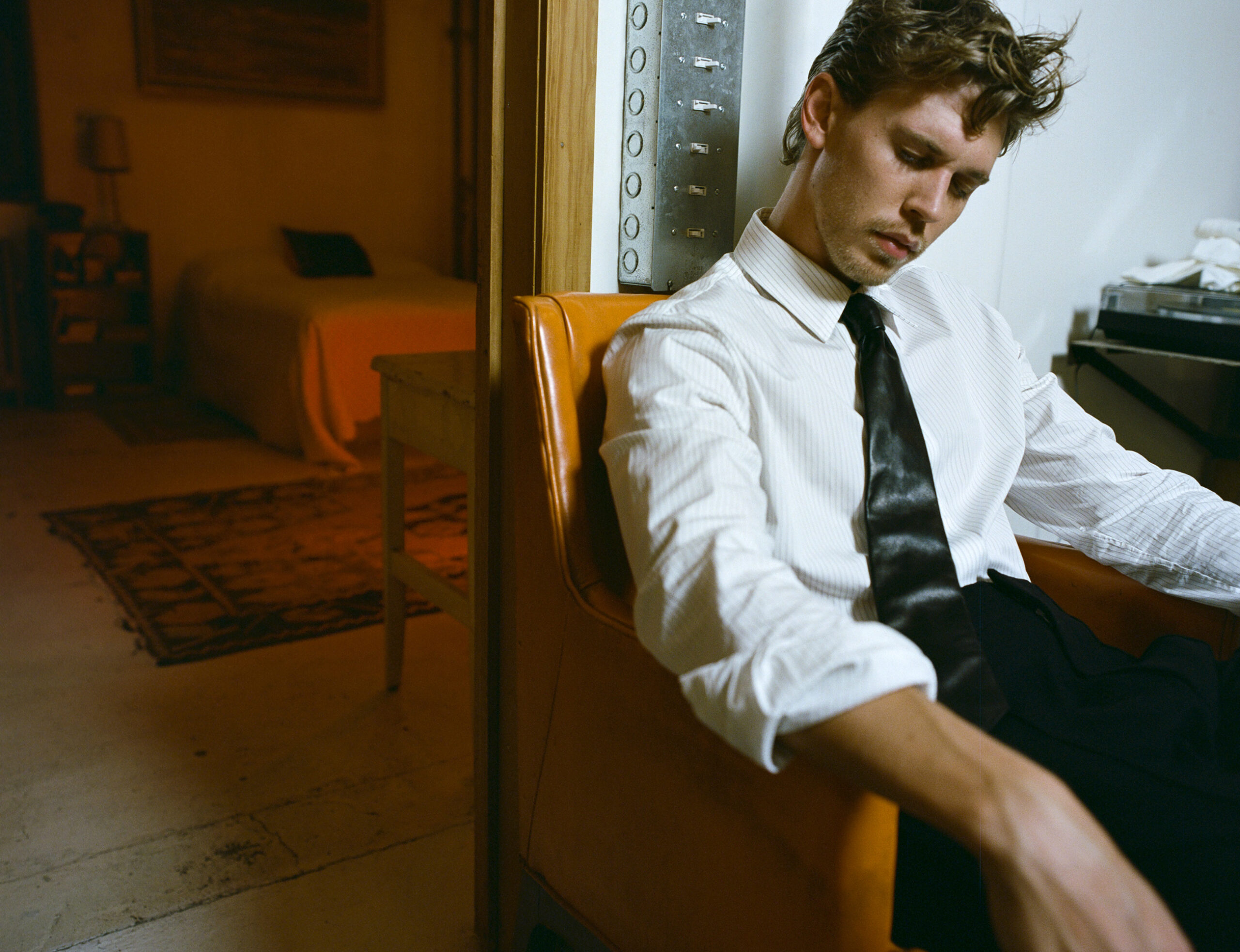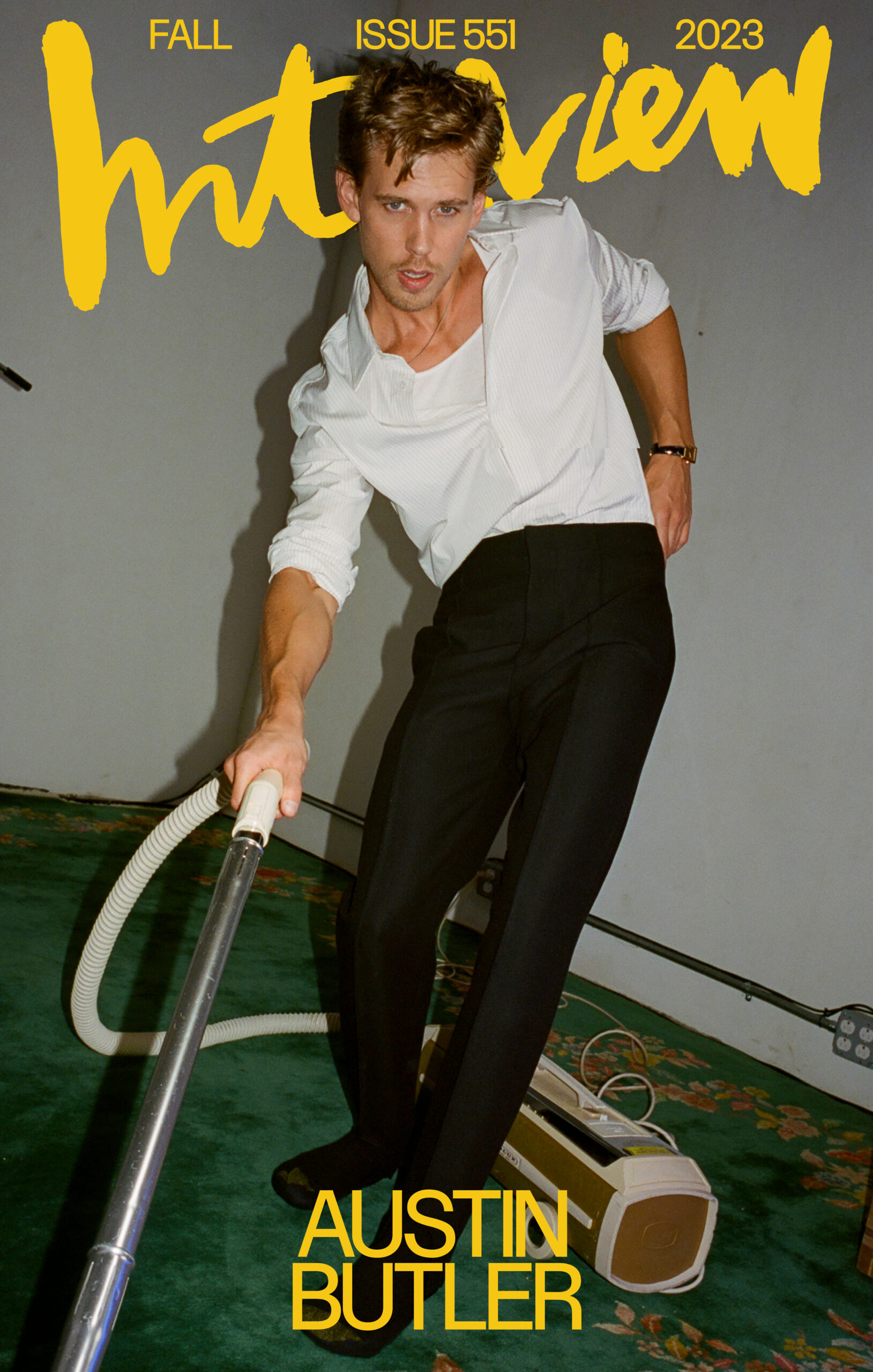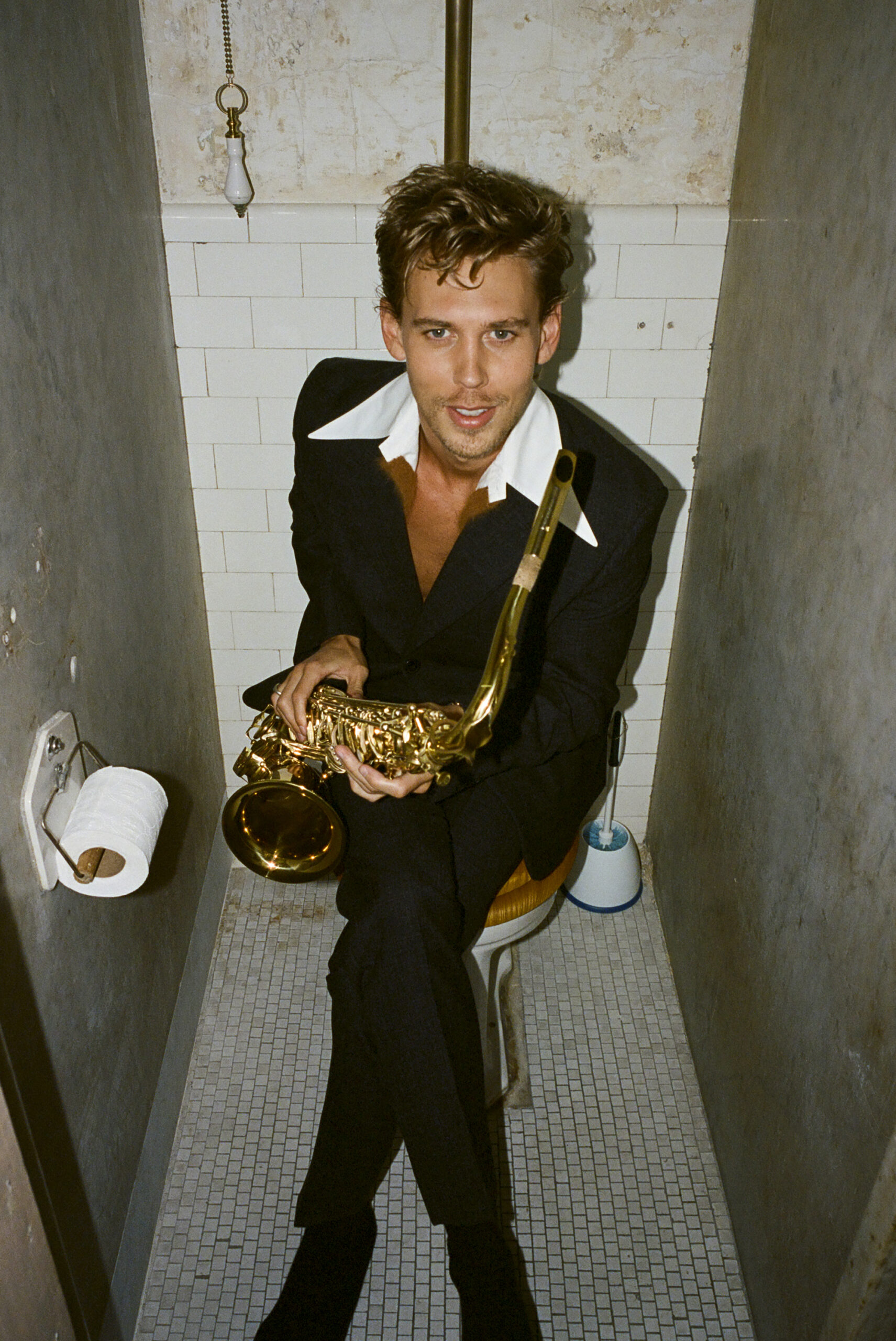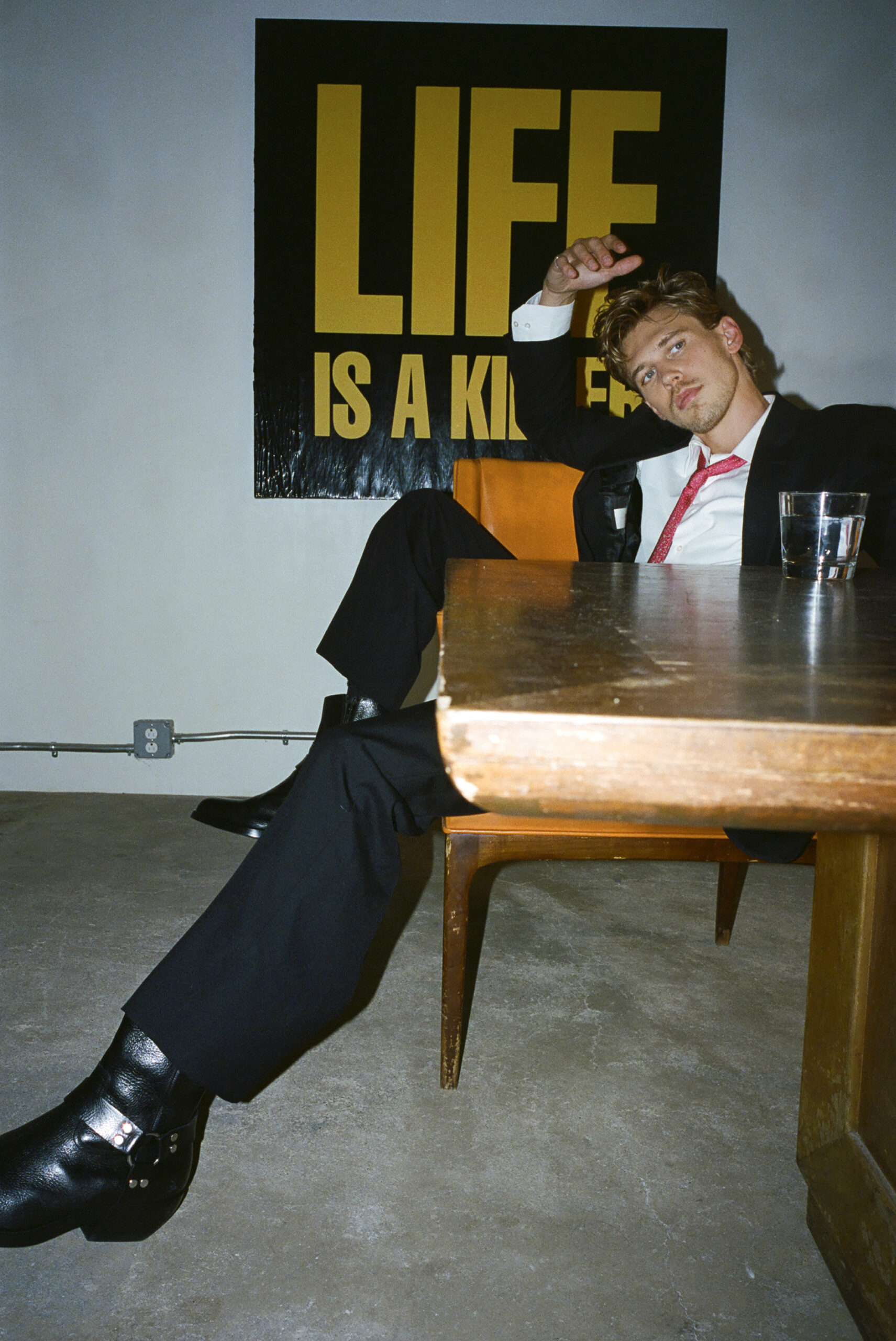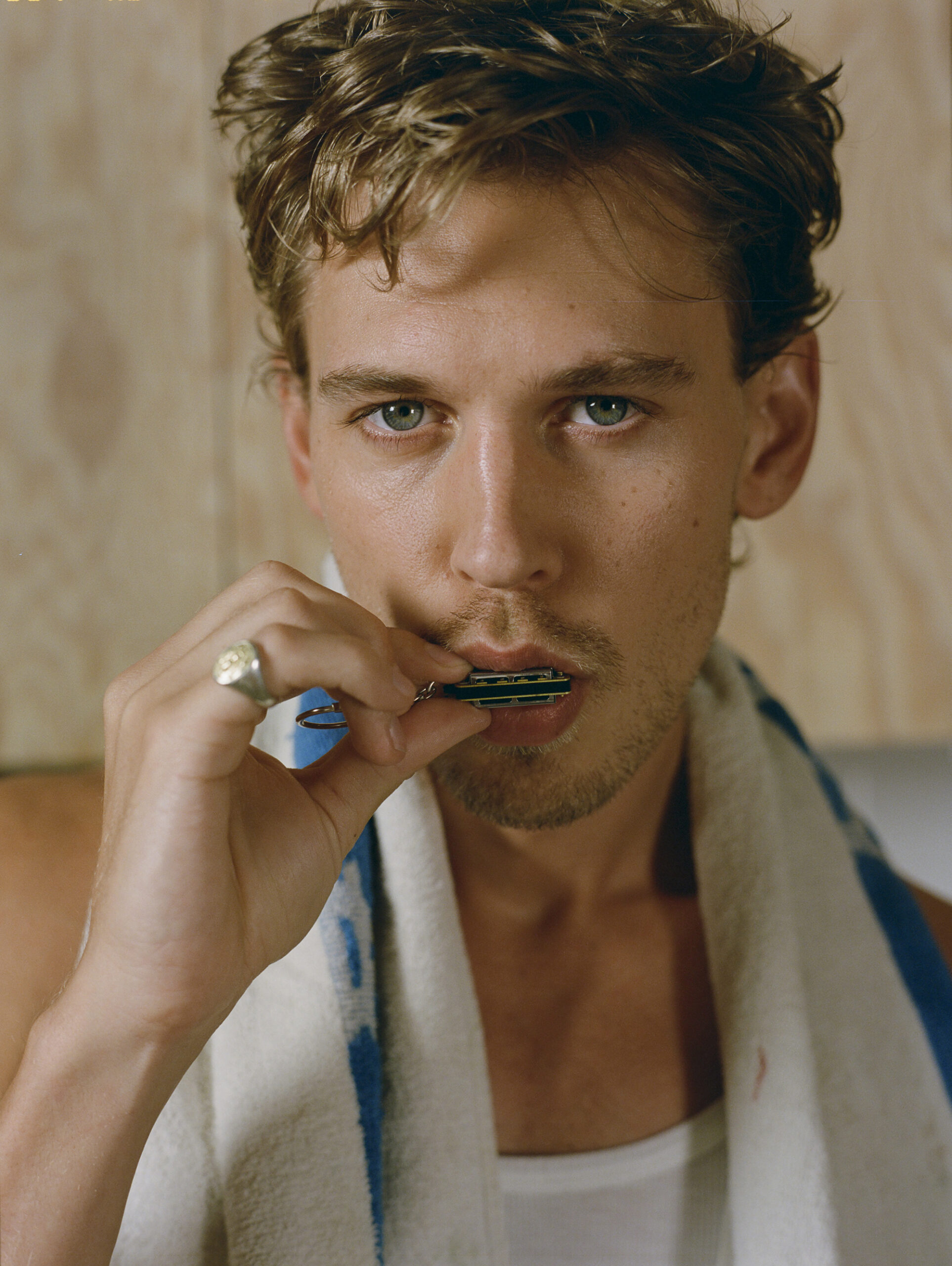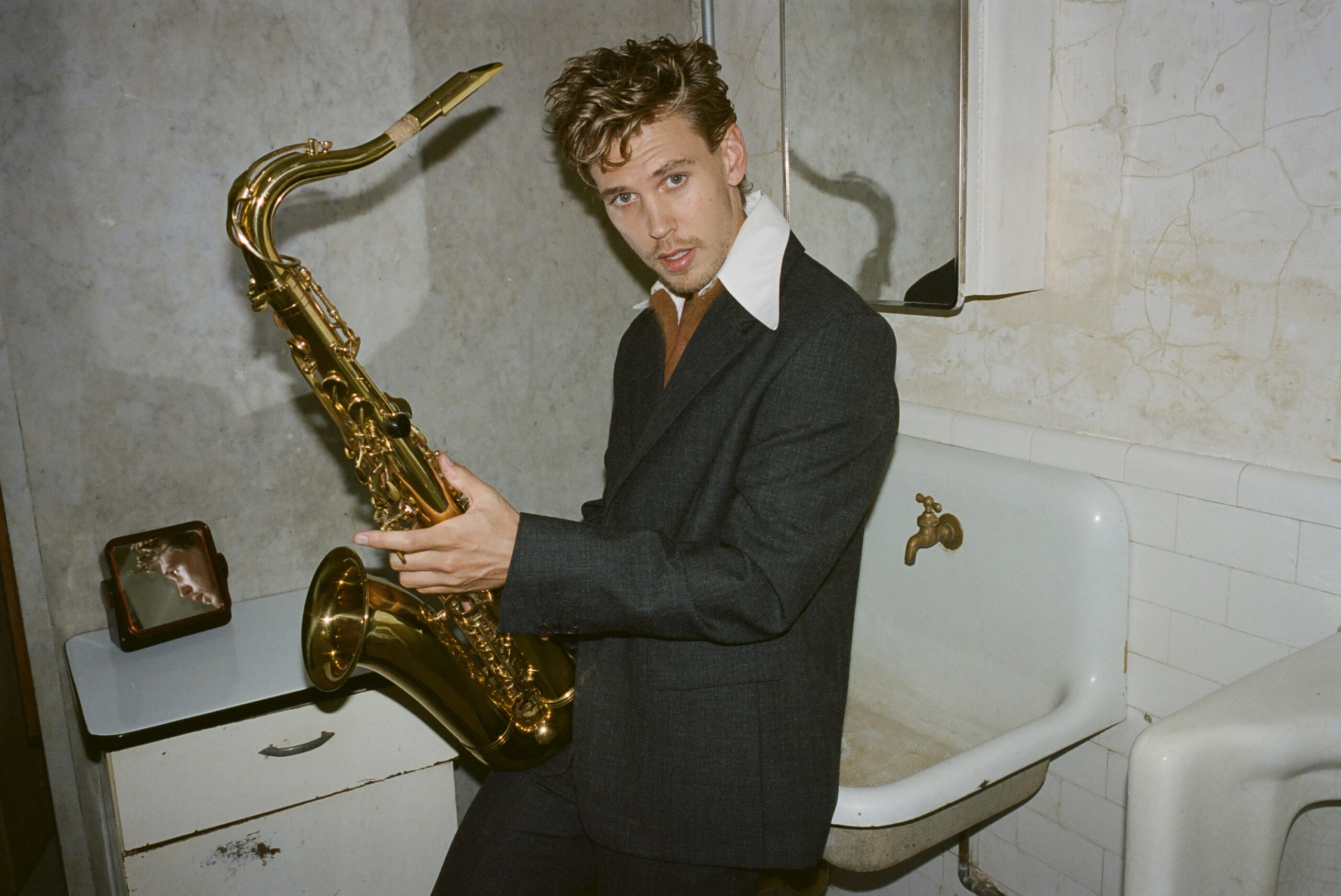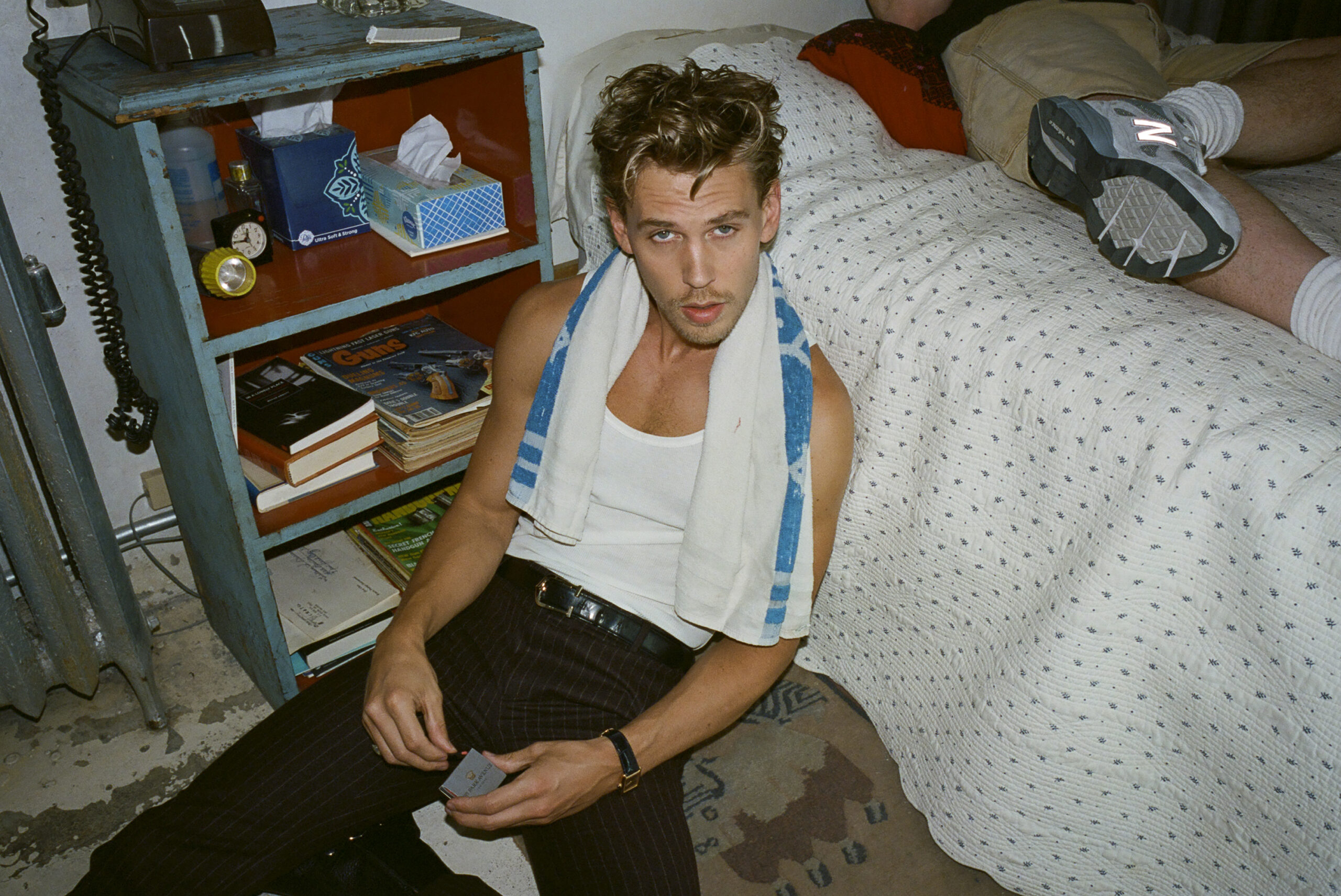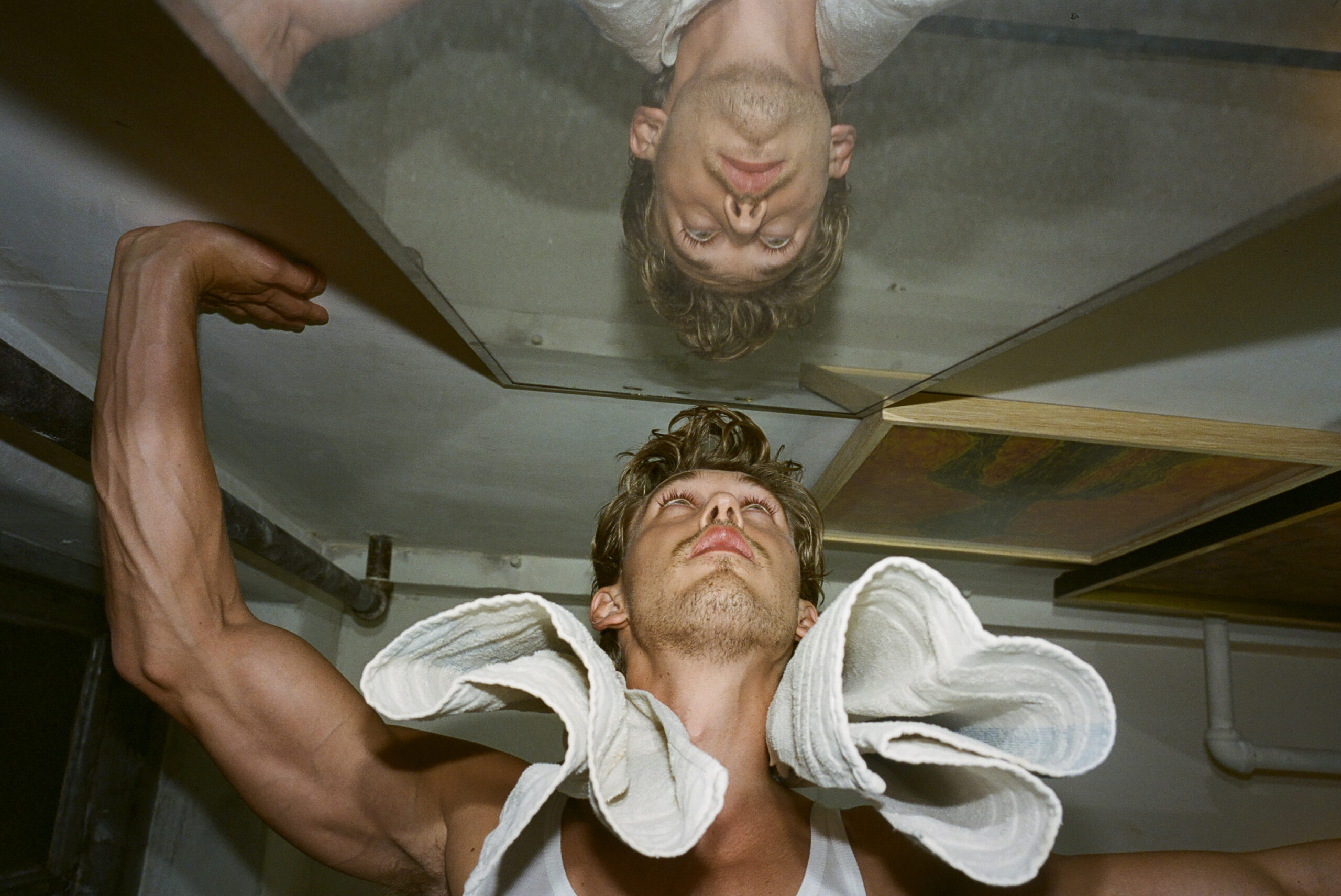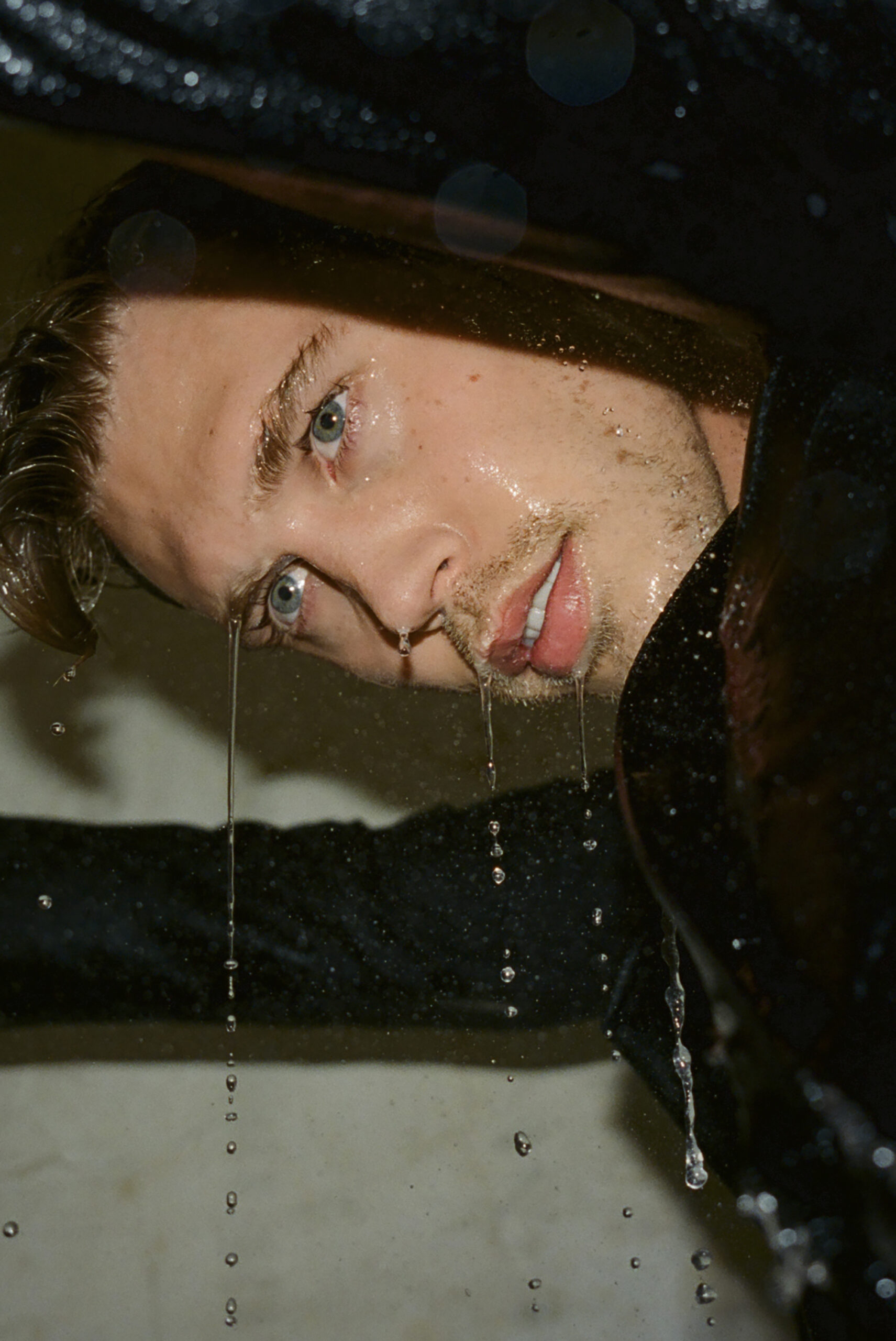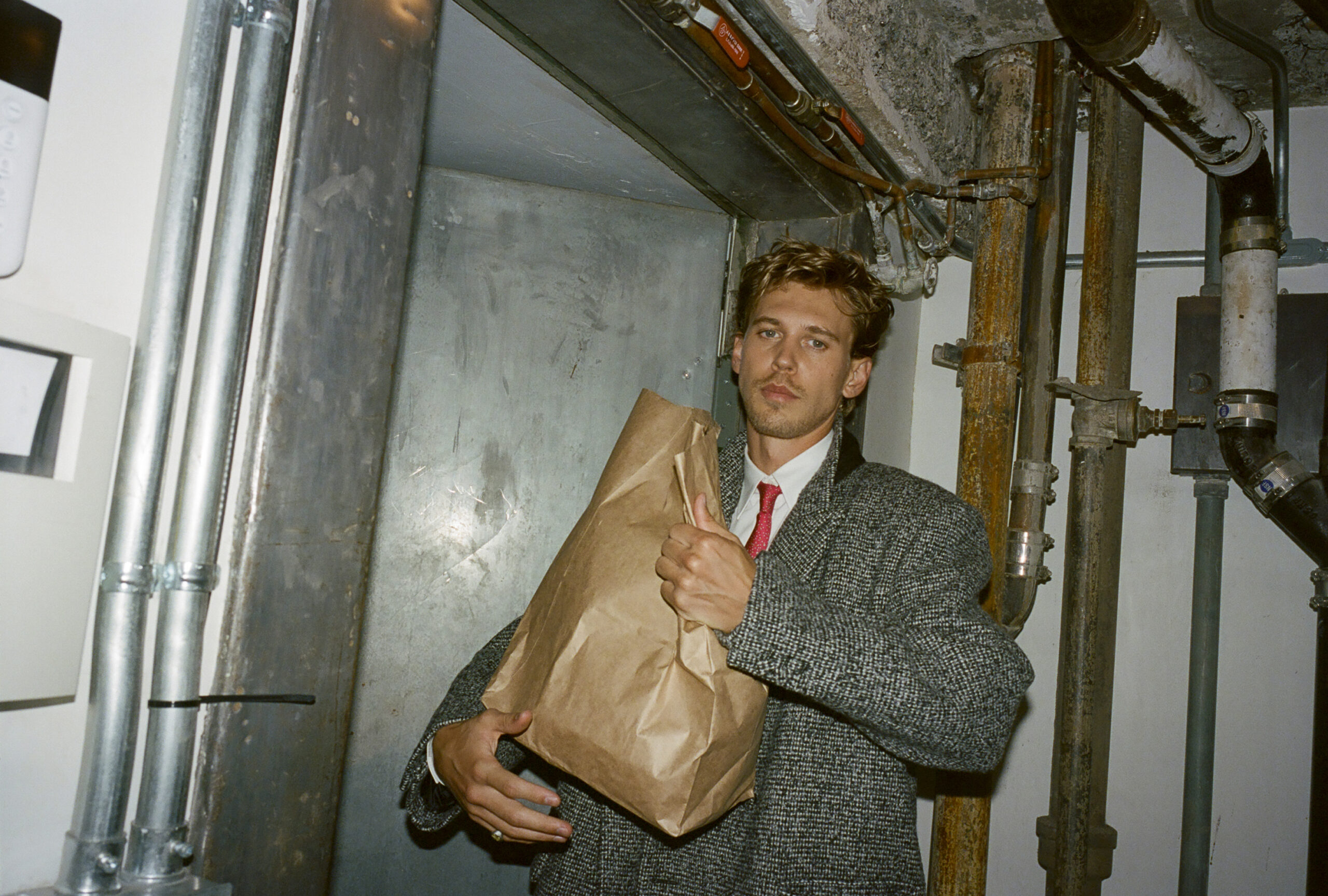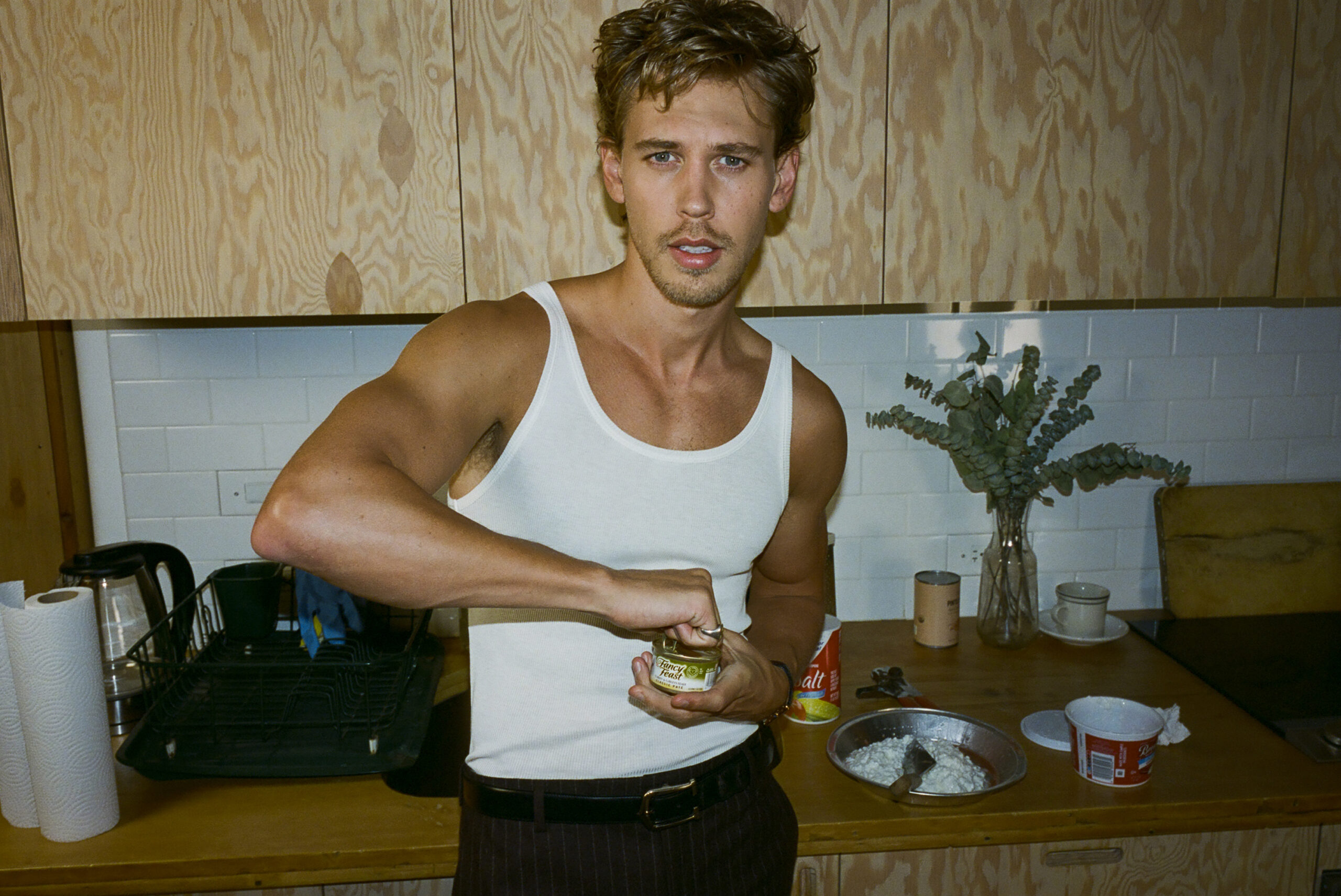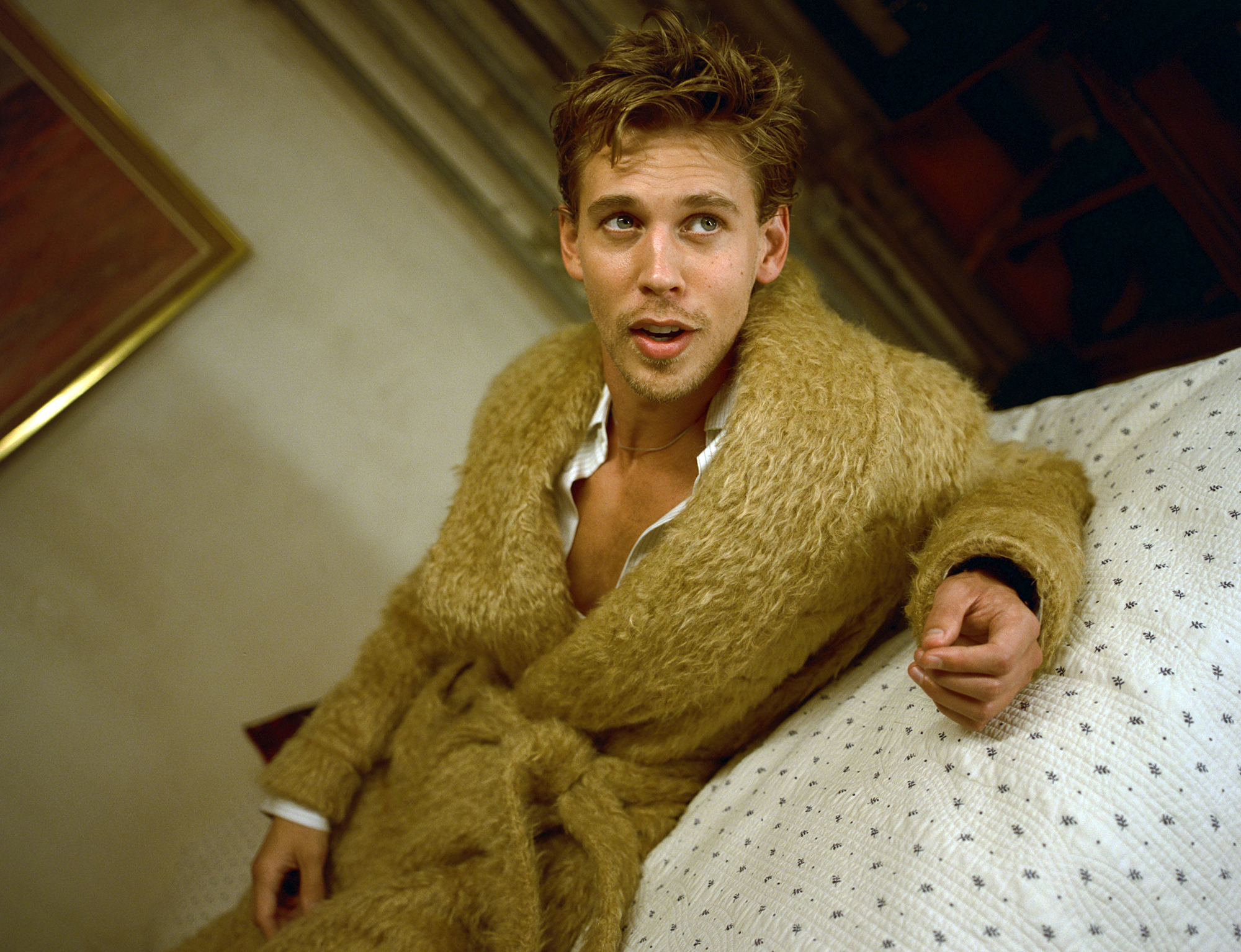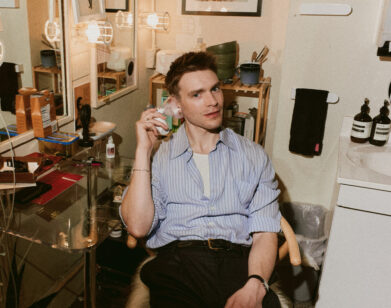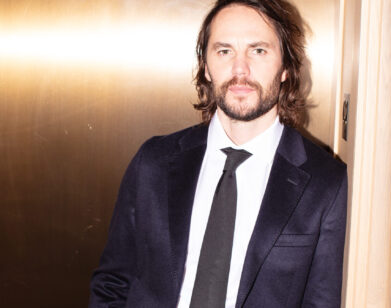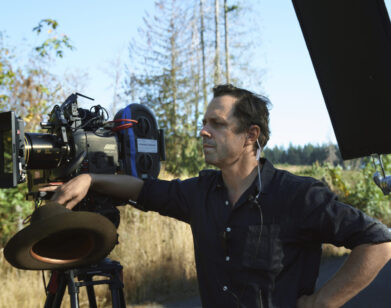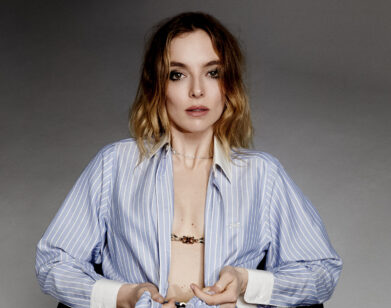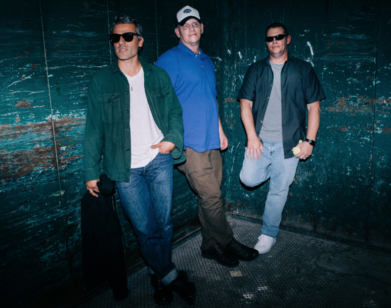COVER
Austin Butler Cleans Up
Austin Butler has “movie star” written all over him. It’s in his face, genetically engineered to smolder. It’s in his backstory, a California kid who paid his dues on the Disney-Nickelodeon-CW circuit until Denzel Washington brought him to Broadway, and Quentin Tarantino invited him back to Hollywood. It’s in his commitment, on full display in his wild and undeniable portrayal of Elvis, which earned him his first Oscar nomination and maybe a new voice. It’s in his taste, following up his star-making role by playing the bald, alabaster heavy Feyd-Rautha in Dune: Part Two, and the heir to a motorcycle gang in this winter’s The Bikeriders. And it’s in his charisma, that inexplicable, magnetic quality that draws people to him like a tractor beam. Just ask his Dune: Part Two costar Josh Brolin.
———
FRIDAY 10 AM JULY 14 , 2023 NYC
JOSH BROLIN: What’s up, buddy?
AUSTIN BUTLER: Man, I’m so happy to see you.
BROLIN: I’m so happy to see you, too.
BUTLER: Are you back in Los Angeles?
BROLIN: No, I’m in ATL. I was in Santa Fe for four months, then New York, which was strange, because I wouldn’t normally think this, but it was inspiring, like oxygen. Then we went to Martha’s Vineyard, which I stayed away from for a very long time because I thought it was elitist. It turns out that it’s quite the opposite. It’s gnarly, scrappy.
BUTLER: Really?
BROLIN: Yeah. You have droves of tourists that come for the summer, and when they all leave, what’s left is 15,000 fucking severe Massachusetts people. But I miss home. I miss our California, man.
BUTLER: Has this all been vacation, or are you working in all these places?
BROLIN: I was working. I have to tell you something, though. This morning I had this deep urge to text you and say, “Hey man, sorry, I can’t do this morning.” It’s an urge to create chaos before intimacy.
BUTLER: I have the same thing.
BROLIN: That’s why I’m telling you.
BUTLER: Well, I’m glad you didn’t.
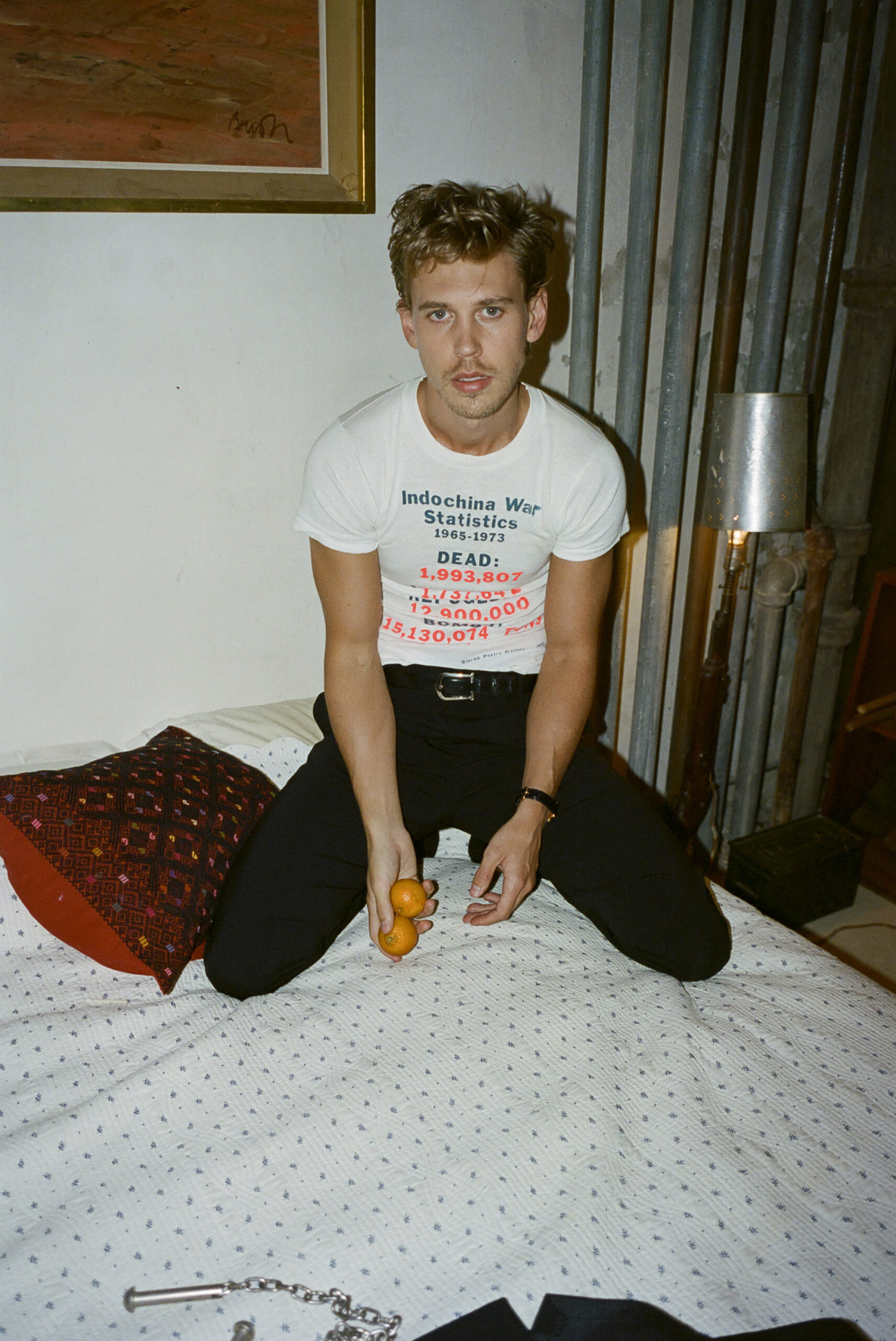
Vintage T-shirt Giorno Poetry Systems. Pants Celine by Hedi Slimane. Belt Stylist’s Own. Watch (worn throughout) Cartier.
BROLIN: It happened immediately. I was going to be like, “I’m sorry I didn’t respond to your text last night, I’m not going to be able to do this today, I hope that we can do it in the future.”
BUTLER: Was it just upon waking?
BROLIN: Yeah. It was like, open my eyes, listen to my 2-year-old sleep-breathing, so there was an ecstasy that came with that, and then I said, “How do I equalize this ecstasy by creating chaos?” You were the first person that popped into my head.
BUTLER: [Laughs] An agent of chaos.
BROLIN: Well, thank you for asking me to do this.
BUTLER: There’s nobody I’d rather be having this conversation with. From that first time we met, when you knocked on my trailer door and we ended up talking for three hours, it felt like we were deeply connected, like I’ve always known you.
BROLIN: This doesn’t happen very often, especially in this day and age, but a whole series of people told me, “You have to meet Austin.” You take it personally, like, “They’re all saying it to me.” But it turns out they were saying it to everybody, because everybody was getting off on you. And the anomaly factor is that you’re very, very good at what you do, and you’re young, which is a rarity, but then you’re kind, which is even more of a rarity. And then on top of it, you’re not a dickhead actor who’s so into his art that he can’t be kind to anybody else, which I never understood.
BUTLER: Yeah.
BROLIN: I’ve been lucky enough to experience fairly kind people, but I’ve also seen the other side, which I don’t particularly take too well. So anyway, that went on for a couple of weeks, and then finally, we were in Budapest, and your trailer was right next to mine, and I just walked over there. I had gotten nervous at that point, you had been talked up so much.
BUTLER: It can only come down.
BROLIN: Yeah. And then I walked in, and you were bald and extremely pasty.
BUTLER: [Laughs] Looked like my best self.
BROLIN: So I had to get over that. And it got conversationally intimate almost immediately, which I appreciated. You offered up pieces of yourself to see what I’d do with them until there was a fairly quick understanding that we were amongst trustworthy friends.
BUTLER: I feel exactly the same way.
BROLIN: I appreciate that. Well, let’s get into this, man. This is for you, but I’ll make it about me somehow.
BUTLER: That would be great. Can I interview you?
BROLIN: Yeah, you can. They sent me a bunch of research, but I don’t need any. I don’t believe in publicity. I don’t believe in doing things that aren’t authentic. So first and foremost, are you reading something right now?
BUTLER: I’m reading Barbarian Days, which is also a world that you sort of grew up in out there in L.A.
BROLIN: That’s a great book.
BUTLER: It feels like surf Kerouac or something. And then my trainer Duffy, who’s one of my good friends, gave me this book called Her. It’s poems, basically about how wonderful women are, from the point of view of love, appreciation, and treating the divine feminine in the most kind and generous and thoughtful way.
BROLIN: That’s a good segue into, do you find yourself surrounded more by women or men? And which do you prefer?
BUTLER: That’s really interesting. When I was growing up, more by women, because I grew up very close to my mom and my sister. I found myself able to open up to women quicker, and once I started hanging out with men who were more like you, who could open up to me quicker, I started to realize it’s not about gender at all. It’s about human connection. That’s what I’m craving.
BROLIN: Right.
BUTLER: Some people, whatever their gender is, have a shell around them. I’m realizing I just like authenticity. I like not having to put on a facade.
BROLIN: I would’ve said women too, and you and I both lost our mothers at a young age, so I’m curious how that affected our relationship with women. My relationship with women is much easier than with men.
BUTLER: I noticed that since losing my mom, I end up finding these mother figures in my life. I have my London mom, Ruthie [Rogers], who runs The River Cafe. We played cards every Sunday night for about a year.
BROLIN: Oh, that’s great.
BUTLER: I’d go over to her house, we’d cook, play cards, and just talk. I definitely crave that maternal energy.
BROLIN: What instigated the relationship between you two?
BUTLER: I went with a friend to The River Cafe, and she ended up sitting down at our table and we had some dice, so we started playing this gambling game, and she and I were on the same team, and we kept winning. So to this day, every time she calls me, she goes, “My dice partner!” And she calls me every other day.
BROLIN: Still?
BUTLER: Yeah. And she’ll say, “I just want to say I love you, and I’m thinking about you, and do you need anything?” And then I’ll say, “Do you need anything?” That love is so needed.
BROLIN: That’s amazing. What hat do you have on right now?
BUTLER: This is a 2002 Sturgis [Motorcyle Rally] hat. Have you been?
BROLIN: I was very close to going, but no. I’ve been to a lot of bike and chopper shows. It’s a community that I’ve always been around and that I love, and that we’ve talked about in the past.
BUTLER: I can’t wait to get back to L.A. and ride together.
BROLIN: I’d love to. There’s a lot of those that I have planned for when I get back. And given that I’m not working right now, I think I’ll take advantage of that opportunity. I just directed for the first time.
BUTLER: I wanted to ask you about that.
BROLIN: Bro. I was talking to Kathryn [Boyd, Brolin’s wife] about you last night, and I’ll tell you why in a second. But that fire that you have, that I noticed when I first met you, and that comes across, because whatever I’ve seen of Dune, that I know you haven’t seen—
BUTLER: I haven’t seen anything. [Laughs]
BROLIN: I haven’t seen the whole movie, but I’ve seen enough to know that your work was not for nothing. There’s really great actors that don’t seem so great when you see them in person. They’re doing shit, and you’re like, “I don’t get it.” And then you see them on film, and you’re like, “Wow.” Not to reveal too much, but you were always off doing your thing, practicing, focusing. And not in a narcissistic, self-absorbed way. It was like, “I’m here to work. Why would I not be working?” I’m the guy on set who’s talking to everybody.
BUTLER: You keep a good pH balance. You manage to keep levity, but you have an inherent professionalism. You know the moment that you can really throw some chaos in there.
BROLIN: I love the idea that this is just for me, and has nothing to do with anybody else. I learned early on that when I was in a dark corner slapping myself before a scene—which is appropriate sometimes—but when I stayed in that all day, I had nowhere to go after.
BUTLER: That’s interesting.
BROLIN: How did you feel working on Dune? Were you nervous? Excited?
BUTLER: I’m always nervous. I always feel an incredible pressure. I felt that when I was 12 years old. Even if the material doesn’t really require it, I feel I need to do the best that I possibly can. That sets a bar, and then I’m always afraid that I’m going to miss something. With Dune it was interesting, because I met with Denis [Villeneuve], and we got along very well, and started talking about the character. At that point, we didn’t even have a script, but as we started talking about Feyd, my imagination started running, and I started to feel the terror of the challenge. That’s what I’m guided by now: What really scares me?
BROLIN: Right.
BUTLER: Because Elvis was terrifying. There was so much pressure, and I was constantly asking myself, “Am I enough? Can I pull off this tightrope act?” That makes you focus and work really hard. The wonderful thing about the reception of that film was realizing that even though I had that terror and questioned my own ability, if I put in the hard work, I set myself up to hopefully affect some people. It means I’m now able to see that terror as a separate thing, and not let it rule me, and instead look at it and go, “I see you. I hear you. I’m not going to let you cripple me.” And then it becomes this jet fuel that makes you wake up at four in the morning with your heart pounding, and you go, “Okay, let’s get to work. Let’s start working on the voice. Let’s start working on the body. Let’s start working on the text.”
BROLIN: Right.
BUTLER: The exciting thing about Dune was that it was completely different from anything I’ve done. And it was also incredibly different from Elvis.
BROLIN: Which is exciting.
BUTLER: Denis is one of the greatest filmmakers alive, so the idea of getting to work with him, and then you, and all of the cast was so exciting for me. The thing with Denis is, you’ll give an idea, and then his mind will start to percolate, and then he’ll come back with 10 more, and then you’re feeding off of each other’s imaginations.
BROLIN: How did Dune translate into The Bikeriders and your experience with that?
BUTLER: After the spectacle of Elvis and Dune, and these characters that were quite different from me, to be able to go to something where—there’s an intimate sensitivity to The Bikeriders. It’s the roaring engines and the smell of grease that we got to be around. It was nice to go to something that felt more independent and play in that space for a bit. But one of the things I was thinking about earlier, when you were talking about that relaxation on set, was that Tom Hardy surprised me. I pictured him to be this grizzly bear, always serious. And really, he’s one of the funniest people I’ve ever met. He’d be joking around until action is called, and then go into being the most intense guy I’d ever seen.
BROLIN: Right.
BUTLER: It reminds me of the stories I heard of [Marlon] Brando, talking to the camera operator until the moment action is called.
BROLIN: That’s right.
BUTLER: I learned a lot from Tom. It reminds me of you, where you can be in that relaxed place where you’re receptive to your environment, and then when the time comes, you can click into what the scene demands. That one was also great because I had a couple of weeks off from Dune. I went back, and just started training on the motorcycles every day.
BROLIN: Crazy.
BUTLER: To get to ride motorcycles through Cincinnati, through these cornfields, it was just amazing. You know what that feels like, where the wind is in your hair. You feel like you’re mainlining god.
BROLIN: That’s beautifully put. It’s that communal aspect. What happened with Dune was a great, communal thing. Maybe different, but what you did professionally is what I do personally with motorcycle riding. There’s the presentation of tough, scrappy, all that kind of stuff, but when it comes down to it, the intimacy factor is very, very high.
BUTLER: There’s such a trust as well, when we’d be in these groups of 40, riding bikes down a tiny road, and you’re thinking, “If anybody were to crash right now, all of us would go down.”
BROLIN: [Laughs] I know.
BUTLER: And we’re not wearing helmets, riding through cornfields as fast as we can.
BROLIN: Doesn’t seem like the most sensible thing
BUTLER: I don’t know how they insured the film, to be honest. [Laughs] And you’re riding behind a picture car as well, it’s kicking up pebbles in your face, so you’re getting hit in the eyes with rocks. It was so visceral.
BROLIN: Sounds like heaven to me.
BUTLER: It was a great group. I wish you could have been out there on the road.
BROLIN: I envy you deeply, and I did the minute I heard you were doing it.
BUTLER: Yeah.
BROLIN: So as a last thing—it’s funny, I wrote down a bunch of questions and I haven’t asked any of them, but how do you feel about the trajectory of your professional life right now?
BUTLER: I feel incredibly grateful, because I’ve been plugging away at this since I was a kid. I’ve had these dreams for so many years, of getting to work with my heroes, and now a lot of that’s coming true. And to be able to delve into these characters that are compelling, and challenging, and scary, has been such a magical time in my life. The thing that I’m now having to come to terms with, and figure out how to process, is when you go out in the street and you are the one being observed. One of my favorite things used to be sitting at a coffee shop and just observing human nature. Now when I’m looking out, people are looking back. Maybe this is part of a longer conversation, but you and I have talked a little bit about when you’re the one being perceived, how can you perceive the authenticity of the world in a way that serves what you love to do, which is the art?
BROLIN: Right.
BUTLER: My fear is that your world can become smaller. That suddenly, when you’re out in the world, you’re not looking people in the eyes as much when you’re walking down the street, because you’re closing yourself off in some way, and then you end up only feeling comfortable in rooms of people that you already know. I want to be able to be around people that I don’t know and feel like I’m really taking in the human condition.
BROLIN: Totally.
BUTLER: That’s been my meditation lately. How do you keep expanding your world rather than closing it down? Any thoughts on that?
BROLIN: Yeah, I have thoughts on everything. What it conjures is that regrounding yourself is massive. And however which way you do that is so important, because I’ve seen a lot of actors, some of them good, some of them better than others, but I’ve seen people lose that sense of self. Money gets in the way, celebrity gets in the way, all that. That comes with becoming more well-known. Elvis is a perfect example, you know what I mean?
BUTLER: Yeah.
BROLIN: De Niro said that at the peak of his career, he still had the ability to walk down a New York street and disappear. I’m paraphrasing, but there was power in that. The thing about Malibu that I’ve always had this love-hate relationship with, is people trying to hide themselves but be seen at the same time.
BUTLER: [Laughs]
BROLIN: “Don’t look at me, don’t look at me, don’t look at me!” And I’m like, “Why are you saying that so loudly?” Even a sober guy like me, people say, “Do you go to special meetings?” I go, “No, I go to public meetings.” And they go, “How does it not go everywhere?” I say, “I don’t care. I say exactly what I want to say. I have nothing to hide.”
BUTLER: Wow.
BROLIN: There’s a power in that. I’m just myself, man, and I know I’m not fucking anybody over. But it’s a long conversation, and it’s something that you’re going to have to deal with more and more because the trajectory of your career is inevitable. You’re a stellar human being and a super talented human being. And if you keep your priorities straight—like I told you early on, I was like, “Don’t fuck this up.”
BUTLER: [Laughs]
BROLIN: Meaning you’re a great human being. Don’t lose it, and everything else will fall into place.
BUTLER: I love you, man.
BROLIN: I love you too, man. These things feel uncomfortable in the beginning, and then you just make them your own and you forget anybody’s even here.
BUTLER: This is exactly what I’m talking about. I’m so excited to go out into the world right now after talking to you.
This interview and photoshoot was completed prior to the SAG-AFTRA strike.
———
Grooming: Amy Komorowski using Circa 1970 at The Wall Group.
Tailor: Shirlee Idzakovich.
Photography Assistant: Eduardo Silva.
Fashion Assistants: Lucy Gaston, Stephan La Cava, and Nicholson Baird.
Production: The Morrison Group.
Retouching: picturehouse + thesmalldarkroom.
Location: Giorno Poetry Systems.

